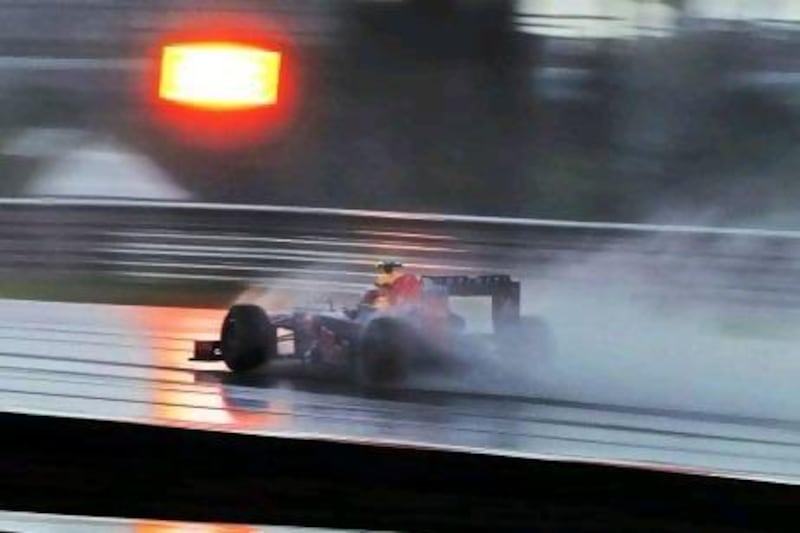It is often said you can set your watch by the monsoon showers at Sepang International Circuit.
Every day at 5pm, the humid heavens open and the sweating masses get soaked. Yesterday's Malaysian Grand Prix provided a prime example; the race, which started at 4pm local time, was suspended for close to an hour.
It is for rain-themed reasons why many observers have dismissed the possibility of Malaysia's annual race, which entered the calendar in 1999, being reborn as a night event.
In 2009, the start time of the race was changed from 3pm to 5pm to better accommodate the sport's dominant European television audience. The plan did not work as the race was suspended due to rain and by the time it had passed there was insufficient light to restart.
If anything, yesterday's weather-afflicted race provides proof for the start time to be brought forward once more rather than pushed back, and yet racing under lights in Malaysia remains a topic of conversation every year the paddock fills with Formula One figureheads.
"That is the thing here," said Razlan Razali, Sepang's chief executive, who has recently ruled out installing expensive lighting. "Typically it rains in the early part of the evening or at night and it hasn't been proven anywhere that a night race can be started in the rain.
"We saw in 2010 at the MotoGP in Qatar that it rained and there is no way the bikes can race at night when it is wet. Singapore has been lucky so far, but Mother Nature can throw up surprises and it would be interesting to see whether the race can go on if it rains. It is a bigger risk."
As well as Singapore, Abu Dhabi is the only other race on the 20-event calendar that involves driving in the dark. With both grands prix successfully strengthening the sport's image as a glamorous, exciting series, Bernie Ecclestone, the commercial rights owner, has proved keen to add more.
Last week in Melbourne, night racing threatened to overshadow the season-opening Australian Grand Prix as Ecclestone labelled the race at Albert Park the "least viable" on the calendar due to its mammoth time difference to the sport's dominant European television market.
Similar has been the case in Malaysia, where Ecclestone has repeatedly pushed for the race's start time to be pushed back to accommodate his European audience.
Razali concedes the F1 chief has put pressure on him in the past, but insists now the decision lies with the circuit.
"Initially, he pushed for it, but he is aware of the cost of it," Razali said. "As much as TV viewership is important to him, it is not to the extent that it is at the expense of the circuit or promoters. He understands it well and leaves it up to us."
In Singapore, more than 1,500 projectors with a total output of 3,000 lux - more than four times brighter than the floodlights used at football stadiums - are used to light the street circuit. The precise cost of the lighting is unknown, however, the Singapore Tourism Board last year reported the event costs S$150 million (Dh436.59m) to stage annually.
"We have already received a quotation from the guys who did the lighting for the race in Singapore and it is very expensive," Razali said. "Immediately that turns us off. If we were to put lights on our circuit, it would need to contribute to the circuit's bottom line, not just the F1."
Razali added that following in the footsteps of his South-east Asian neighbours was also a reason for his reluctance.
~ ~ ~ ~ ~ ~ ~ ~ ~ ~ ~ ~ ~ ~ ~ ~ ~ ~ ~ ~ ~ ~ ~ ~ ~ ~ ~ ~ ~ ~ ~ ~ ~ ~ ~ ~ ~ ~ ~ ~ ~ ~
~ ~ ~ ~ ~ ~ ~ ~ ~ ~ ~ ~ ~ ~ ~ ~ ~ ~ ~ ~ ~ ~ ~ ~ ~ ~ ~ ~ ~ ~ ~ ~ ~ ~ ~ ~ ~ ~ ~ ~ ~ ~
"We don't want to be in a position whereby we should do a night race just because Singapore do a night race," he said. "We have not seen a permanent circuit like the SIC do a night race, neither do we want to be the first to do it. What we should consider instead perhaps is to do alternate years."
As it stands, there is only one race on the calendar that rotates venues - Nurburgring and Hockenheim share the German Grand Prix - but there have been strong suggestions that due to the global economic climate, the growing demand for races around the world and a nine-month calendar that has reached saturation point, it could become more popular.
Barcelona, host of the Spanish Grand Prix, and Valencia, host of the European Grand Prix, have spoken in recent weeks of a desire to rotate, while France is looking to return to the calendar and may offer to alternate with Belgium.
"Being a company that is owned by the Ministry of Finance, budget is hard to come by," Razali said. "[Rotation] is something that both Singapore and Malaysia should consider."
Malaysia's contract with Formula One expires in 2015 and any decision whether it will be extended will only become clearer once an economic impact study is published after this month.
"The positives of having the event in Malaysia are good, so we need to present that to the government," he said. "Then the prime minister and his cabinet ministers decide. It is clear that it has brought some economic impact, but we need to properly measure and quantify it because we have not done a financial study in 13 years."
Only once the study is published can the clouds clear and questions be answered; for now, at least, the lights remain off for night racing at Sepang.





